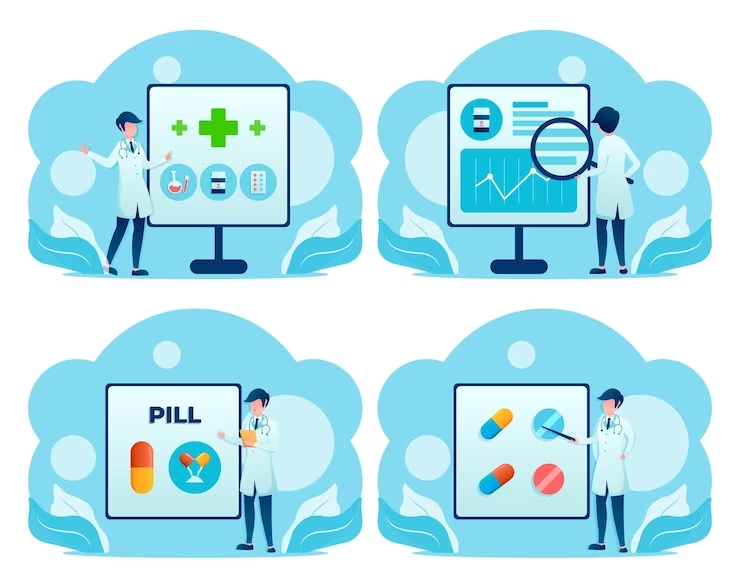
From Data to Decisions: How EHRs Support Clinical Decision-Making
As healthcare becomes increasingly data-driven, healthcare providers need efficient ways to access and analyze patient information to make informed decisions. Electronic health records (EHRs) provide a comprehensive digital platform that enables healthcare providers to capture, store, and share patient data in real-time.
In a survey by the Office of the National Coordinator for Health Information Technology, over 90% of hospitals in the United States have implemented an EHR system. The ability to access this data quickly and efficiently has made EHRs a valuable tool in clinical decision-making.
From patient histories to diagnostic test results, EHRs offer healthcare providers a wealth of data that can be used to make informed decisions about patient care.
This blog post will explore how EHRs support clinical decision-making and the critical features of EHRs that make them valuable assets in healthcare. We will also discuss the benefits and challenges of EHR implementations and best practices for successful adoption.
The Role of EHRs in Improving Clinical Decision-Making

Clinical decision-making is a critical healthcare process involving evaluating patient information, making a diagnosis, and developing a treatment plan. The quality of clinical decision-making directly impacts patient outcomes, and therefore, healthcare providers must have access to accurate and timely patient data to make informed decisions.
Electronic health records (EHRs) are digital systems that capture and store patient information in a central location. They provide healthcare providers with a comprehensive view of a patient’s medical history, including past treatments, lab results, imaging studies, and medication lists. EHRs allow healthcare providers to access this information in real-time, enabling them to make timely and accurate clinical decisions.
With EHRs, healthcare providers can access a patient’s complete medical record, including diagnoses and treatments. This comprehensive view of a patient’s health status can help healthcare providers make more informed decisions. EHRs can provide decision support tools, such as alerts and reminders, to identify potential medication errors.
EHRs also enable healthcare providers to share patient data with other care team members, including specialists, nurses, and pharmacists. This collaboration and information-sharing help ensure that all care team members access the same information, resulting in better-coordinated care.
Leveraging Electronic Health Records to Improve Clinical Decision-Making in Healthcare.

Electronic Health Records (EHRs) are digital versions of a patient’s medical record that capture and store patient information electronically. EHRs have numerous benefits in clinical decision-making, from comprehensive patient data to real-time data access and decision support tools.
EHRs capture all patient medical history aspects, including diagnoses, treatments, medications, and laboratory results. This holistic view of a patient’s medical history helps healthcare providers make more informed decisions and reduce the risk of medication errors. EHRs also enable healthcare providers to identify potential interactions between medications or treatments, which can impact patient outcomes.
EHRs also provide real-time data access, which is critical in clinical decision-making. Providers can access patient data quickly, allowing for faster diagnosis and treatment. EHRs also enable providers to make decisions based on the latest patient information, leading to more accurate and informed decisions. This real-time access to patient data is especially critical in emergencies, where every minute counts.
In addition to comprehensive patient data and real-time data access, EHRs provide decision support tools to aid healthcare providers in making informed care decisions. Decision support tools in EHRs include Clinical Decision Support Systems (CDSS) that provide alerts and reminders to healthcare providers about drug interactions, allergies, and other potential issues. These tools can help providers avoid medication errors and provide optimal care based on the latest evidence-based medicine and best practices.
Key Features of EHRs That Support Clinical Decision-Making
Electronic Health Records (EHRs) are powerful tools that enable healthcare providers to access and analyze patient data in real time, leading to more informed and accurate clinical decision-making. This section will discuss some of the critical features of EHRs that support clinical decision-making.
1.Interoperability
One of the essential features of EHRs is their ability to integrate with other systems and exchange data seamlessly. Interoperability enables healthcare providers to access patient data from multiple sources, including hospitals, clinics, pharmacies, and labs. This feature is essential in clinical decision-making, as it provides a comprehensive view of the patient’s medical history and enables providers to make informed decisions.
2.Structured Data
EHRs capture and store patient data in a structured format that is easy to access and analyze. Structured data enables healthcare providers to search and retrieve patient information quickly, leading to faster and more accurate clinical decision-making. In addition, structured data can generate reports and analytics, providing insights into patient health trends and outcomes
3.Decision Support Tools
EHRs also provide decision-support tools that help healthcare providers make informed clinical decisions. These tools include alerts, reminders, and clinical guidelines based on the latest evidence-based medicine and best practices. Decision support tools can help providers avoid medication errors, reduce the risk of adverse drug reactions, and improve patient outcomes.
4.Real-time Data Access
Real-time data access is another crucial feature of EHRs that supports clinical decision-making. With EHRs, healthcare providers can access patient data in real-time, enabling them to make informed decisions quickly. Real-time data access is essential in emergencies, where every minute counts.
5.Patient Portal
EHRs allow patients to access their medical records and communicate with their providers. Patient portals improve patient engagement and allow patients to participate actively in their care. Patients can access their medical records, schedule appointments, request prescription refills, and communicate with their healthcare providers, leading to better health outcomes.
Real-Life Success Stories: How EHRs Have Improved Clinical Decision-Making
Electronic Health Records (EHRs) have been implemented successfully in many healthcare settings worldwide. This section will discuss real-life examples of successful EHR implementations in clinical decision-making.
1.Intermountain Healthcare
Intermountain Healthcare is a non-profit healthcare system based in Utah, USA. In 2016, they implemented a new EHR system across all their hospitals and clinics. The new design included decision support tools that provided real-time alerts and reminders to healthcare providers.
As a result, Intermountain Healthcare saw a 35% reduction in sepsis mortality rates, a 23% reduction in ICU length of stay, and a 25% reduction in readmission rates. The new EHR system also helped Intermountain Healthcare save over $100 million in healthcare costs.
2.Kaiser Permanente
Kaiser Permanente is a managed care organization based in California, USA. In 2004, they implemented an EHR system across all their hospitals and clinics. The new system included decision support tools that provided real-time alerts and reminders to healthcare providers.
As a result, Kaiser Permanente saw a 26% reduction in heart failure mortality rates, a 15% reduction in hospitalization rates, and a 13% reduction in the cost of care. The new EHR system also helped Kaiser Permanente save over $1 billion in healthcare costs.
3.Singapore General Hospital
Singapore General Hospital is a public hospital in Singapore. In 2013, they implemented an EHR system with decision support tools and real-time data analytics. The new system enabled healthcare providers to access and analyze patient data in real-time, leading to faster and more informed clinical decision-making.
As a result, Singapore General Hospital saw a 28% reduction in the length of hospital stays, a 10% reduction in readmission rates, and a 20% reduction in the cost of care.
KiviCare is the Ultimate Solution!
KiviCare is the Complete clinic management solution for medical professionals who want to provide exceptional patient care while also efficiently managing their clinic. It’s more than just a tool for treating patients; it’s a comprehensive platform that helps medical professionals achieve success. With KiviCare’s dedicated homepages for medical specialties like Neurology and Psychiatry, you can showcase your expertise and attract the right patients to your clinic.
What sets KiviCare apart is its adaptability. As a WooCommerce-integrated theme, KiviCare enables you to create a profitable eCommerce website. Furthermore, the Elementor Page Builder and Slider Revolution Responsive WordPress plugins allow you to create a visually stunning website in a matter of minutes.
But KiviCare’s most significant strength lies in its patient management capabilities. With the KiviCare Plugin and Clinic and Patient Management System EHR, you can efficiently manage patient data and ensure that patient information is secure and readily available. With the Telemed and WooCommerce Payment Gateway add-ons, you can even offer remote consultations and accept online payments.
So, if you’re a medical professional looking for a reliable partner to assist you in achieving clinic success, look no further than KiviCare – the ultimate WordPress theme for medical professionals!